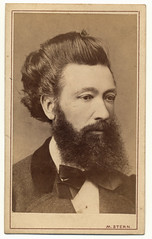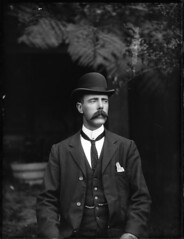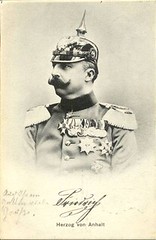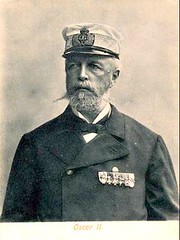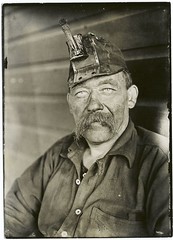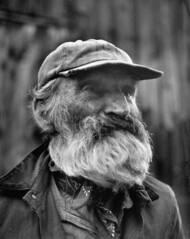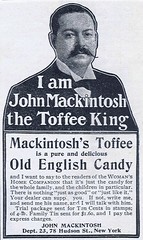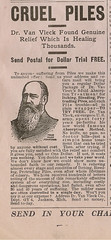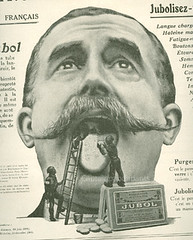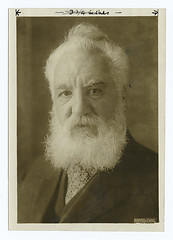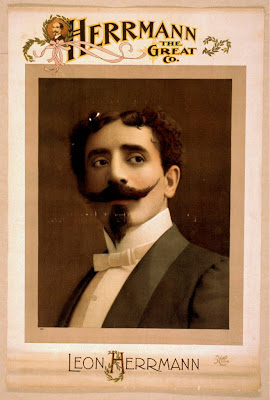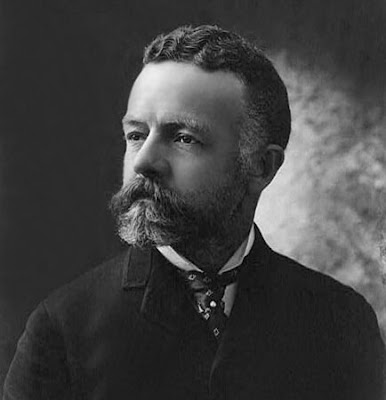Sunday, December 5, 2010
Astronomer and Alchemist Tycho Brahe had a Fantastic Mustache
Tycho Brahe (14 December 1546 – 24 October 1601), born Tyge Ottesen Brahe, was a Danish nobleman known for his accurate and comprehensive astronomical and planetary observations. Coming from Scania, then part of Denmark, now part of modern-day Sweden, Tycho was well known in his lifetime as an astronomer and alchemist.
In his De nova stella (Of new stars) of 1573, he refuted the theory of the celestial spheres by showing the celestial heavens were not in an immutable or unchanging state of perfection as previously assumed by Aristotle and Ptolemy. His precise measurements indicated that "new stars" (now known as novae or supernovae), in particular that of 1572, lacked the parallax expected in sub-lunar phenomenon, and were therefore not "atmospheric" tail-less comets as previously believed, but occurred above the atmosphere and moon. Using similar measurements he showed that comets were also not atmospheric phenomena, as previously thought, and must pass through the supposed "immutable" celestial spheres.
Saturday, November 27, 2010
Adm. E.W. Eberle (LOC)
www.history.navy.mil/library/Bios/eberle_ew.html
Monday, November 22, 2010
Saturday, November 6, 2010
Portrait of a mustachioed man in suit with waistcoat
Portrait of a man in suit with waistcoat
Originally uploaded by Powerhouse Museum Collection
Wednesday, October 20, 2010
Dashing Young Man by Barron of Sarnia, ON - Carte de Visite
Dashing Young Man by Barron of Sarnia, ON - Carte de Visite
Originally uploaded by snap-happy1
A fantastic mustache, and a great tie too.
Wednesday, October 13, 2010
Großherzog Friedrich I. von Baden 1826 - 1907, Grand Duke of Baden
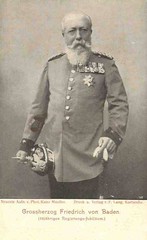
Großherzog Friedrich I. von Baden 1826 - 1907, Grand Duke of Baden
Originally uploaded by Miss Mertens
Grand Duke Friedrich I of Baden (* 9. September 1826 in Karlsruhe, 28. September 1907 on the island Mainau) Was 1852-1856 Regent and from 1856 until his death in 1907 Grand Duke of Grand Duchy Baden.
Friday, July 30, 2010
Whisk Broom Beard of Belgian King, Leopold II (1835-1909)
..jpg)
Location: Belgium
Date taken: 1900
Leopold is chiefly remembered as the founder and sole owner of the Congo Free State, a private project undertaken by the King. He used Henry Morton Stanley to help him lay claim to the Congo, an area now known as the Democratic Republic of the Congo. The Powers at Berlin Conference agreed to set up the Free State in 1885, on condition that the inhabitants were to be brought into the modern world and that all nations be allowed to trade freely. From the beginning, however, Leopold essentially ignored these conditions and ran the Congo brutally, by proxy through a mercenary force, for his own personal gain. He extracted a personal fortune from the Congo, initially by the collection of ivory, and after a rise in the price of rubber in the 1890s by forcing the native population to collect sap from rubber plants. His harsh regime was directly or indirectly responsible for the death of millions of people. The Congo became one of the most infamous international scandals of the early 20th century, and Leopold was ultimately forced to relinquish control of it to the government of Belgium.
Monday, July 26, 2010
Happy Birthday George Bernard Shaw
 from Wikipedia:
from Wikipedia:George Bernard Shaw (26 July 1856 – 2 November 1950) was an Irish playwright.
Although his first profitable writing was music and literary criticism, in which capacity he wrote many highly articulate pieces of journalism, his main talent was for drama, and he wrote more than 60 plays. Nearly all his writings deal sternly with prevailing social problems, but have a vein of comedy to make their stark themes more palatable. Shaw examined education, marriage, religion, government, health care and class privilege.
He was most angered by what he perceived as the exploitation of the working class, and most of his writings censure that abuse. An ardent socialist, Shaw wrote many brochures and speeches for the Fabian Society.
He became an accomplished orator in the furtherance of its causes, which included gaining equal rights for men and women, alleviating abuses of the working class, rescinding private ownership of productive land, and promoting healthy lifestyles.

Monday, July 19, 2010
Herzog Friedrich von Anhalt
Herzog Friedrich von Anhalt had a fantastic mustache and a nice helmet too.
from Wikipedia: Frederick II (19 August 1856 - 22 April 1918) was a Duke of Anhalt.
He was born in Dessau the second son of Hereditary Prince Frederick of Anhalt-Dessau and his wife Princess Antoinette of Saxe-Altenburg.[1] In 1863 his grandfather Leopold IV became Duke of the united Duchy of Anhalt following the death of the last Duke of Anhalt-Bernburg. His father succeeded as Duke of Anhalt on 22 May 1871. Frederick became heir apparent and Hereditary Prince following the death of his brother Leopold on 2 February 1886. Frederick was married on 2 July 1889 at Karlsruhe to Princess Marie of Baden, elder sister of Prince Maximilian of Baden, 8th Chancellor of Germany.[2]
On 24 January 1904 he succeeded his father as Duke of Anhalt.[3] During his reign he was known for his love of music and maintained a Court Theatre which became celebrated throughout Europe.[4] He died at Ballenstedt Castle and was succeeded by his brother Eduard.
Tuesday, June 29, 2010
Wednesday, June 23, 2010
King Oscar II. of Sweden 1829 - 1907
source: wikipedia.org
Monday, May 31, 2010
Tuesday, May 4, 2010
Sunday, April 18, 2010
Saturday, April 3, 2010
Portrait of Man with Moustache
This image is part of a collection of over 6,000 glass plate negatives created by Charles J. Van Schaick. Van Schaick learned the art of photography after moving to Jackson County, Wisconsin. In 1885, he opened a studio in Black River Falls, Wisconsin and served as the town photographer for over 50 years. His work includes both studio portraits and richly varied and intimate snapshots of small-town, Wisconsin life. A portion of his photographic work is represented in Wisconsin Death Trip by Michael Lesy.
For more information about this image, click here:
www.wisconsinhistory.org/whi/fullRecord.asp?id=28956
Saturday, March 27, 2010
Doctor Sweany's 1895 Mustache
Doctor Sweany,
737 Market St.,
San Francisco, CAL
Opposite Examiner Office
Friday, March 26, 2010
Dr. Francisco Bertrand, President of Honduras
 Francisco Bertrand (1866–1926) was twice President of Honduras, first from March 28, 1911 to February 1, 1912, and then again between March 21, 1913 and September 9, 1919.
Francisco Bertrand (1866–1926) was twice President of Honduras, first from March 28, 1911 to February 1, 1912, and then again between March 21, 1913 and September 9, 1919.
His successor and predecessor was Manuel Bonilla.
Bertrand started out with a reputation as a conciliator, but during his last presidency was involved in armed conflict with his political opponents.
It is believed that United States of America pressure was behind his abandoning the post of President. He spent the next few years in exile before returning to La Ceiba, Honduras to die in July 1926.
Source:en.wikipedia.org/wiki/Francisco_Bertrand
Bain News Service,, publisher.Dr. Francisco Bertrand - Pres. of Honduras[no date recorded on caption card]
1 negative : glass ; 5 x 7 in. or smaller.
Notes:Title from unverified data provided by the Bain News Service on the negatives or caption cards.
Forms part of: George Grantham Bain Collection (Library of Congress).
Format: Glass negatives.
Rights Info: No known restrictions on publication.
Repository: Library of Congress, Prints and Photographs Division, Washington, D.C. 20540 USA, hdl.loc.gov/loc.pnp/pp.print
General information about the Bain Collection is available at hdl.loc.gov/loc.pnp/pp.ggbain
Persistent URL: hdl.loc.gov/loc.pnp/ggbain.12676
Call Number: LC-B2- 2653-6
Saturday, March 20, 2010
1915 Jubol Man Getting Tongue Scrubbed Ad
Thursday, March 18, 2010
President Grover Cleveland
Stephen Grover Cleveland (March 18, 1837 – June 24, 1908) was the 22nd and 24th President of the United States. Cleveland is the only president to serve two non-consecutive terms (1885–1889 and 1893–1897) and therefore is the only individual to be counted twice in the numbering of the presidents. He was the winner of the popular vote for president three times—in 1884, 1888, and 1892—and was the only Democrat elected to the presidency in the era of Republican political domination that lasted from 1860 to 1912. Cleveland's admirers praise him for his honesty, independence, integrity, and commitment to the principles of classical liberalism. As a leader of the Bourbon Democrats, he opposed imperialism, taxes, subsidies and inflationary policies. As a reformer he also worked against corruption, patronage, and bossism.
Some of Cleveland's actions caused controversy within his own party. He used the presidential veto 584 times, far more than any president before him. His intervention in the Pullman Strike of 1894 in order to keep the railroads moving angered labor unions, and his support of the gold standard and opposition to free silver alienated the agrarian wing of the Democrats. Furthermore, critics complained that he had little imagination and seemed overwhelmed by the nation's economic disasters—depressions and strikes—in his second term. Even so, his reputation for honesty and good character survived the troubles of his second term. Biographer Allan Nevins wrote, "in Grover Cleveland the greatness lies in typical rather than unusual qualities. He had no endowments that thousands of men do not have. He possessed honesty, courage, firmness, independence, and common sense. But he possessed them to a degree other men do not."
Saturday, March 13, 2010
Tuesday, March 9, 2010
Friday, March 5, 2010
Gen. Philip Henry Sheridan's Civil War Mustache
There is an anecdote told concerning Sheridan during his campaign against the
Indians. Comanche Chief Tosawi, or Silver Knife, reputedly told Sheridan in 1869, "Me Tosawi. Me good Indian," to which Sheridan is said to have replied, "The only good Indians I ever saw were dead."[46]
This was then misquoted as "The only good Indian is a dead Indian". Sheridan later denied he had made the statement to Tosawi. Earlier that year, on May 28, Rep. James M. Cavanaugh said in the House, "I have never seen in my life a good Indian ... except when I have seen a dead Indian." That remark may have been mistakenly attributed to Sheridan.
 Gen. Philip Henry Sheridan
Gen. Philip Henry Sheridan(March 6, 1831 – August 5, 1888)
Nickname: Little Phil
Place of birth: Albany, New York
Place of death: Nonquitt, Massachusetts
Place of burial:Arlington National Cemetery
Allegiance: United States of AmericaUnion
Service/branch: United States ArmyUnion Army
Years of service: 1853–88
Rank: General of the Army of the United States
Commands held: Cavalry Corps (Army of the Potomac), Army of the Shenandoah, United States Army
Battles/wars: American Civil War, Battle of Perryville. Battle of Stones River, Battle of Chattanooga, Overland Campaign, Valley Campaigns of 1864, Appomattox Campaign, Indian Wars
Wednesday, March 3, 2010
Alexander Graham Bell
(March 3, 1847 – August 2, 1922) was an eminent scientist, inventor, engineer and innovator who is credited with inventing the first practical telephone.
Monday, March 1, 2010
Kaiser Franz Josef I. of Austria
Monday, February 22, 2010
Archduke Francis Ferdinand's Assasination started World War I
Saturday, February 20, 2010
Seijiro Hirai, Japanese civil engineer.
Hirai was born in Kanazawa, Japan. He was chosen by Japan to be one of the first to study abroad and he attended Rensselaer Polytechnic Institute. He received his M.S. in civil engineering in 1878. He worked for the U.S. government before becoming a railway engineer in the Colonization Bureau for Hokkaido in 1881. In 1882 he was appointed chief of the railway for the Mining and Railway Bureau for Hokkaidō. He later became the chief engineer of the Osaka Railway Company.
He eventually joined the government of Japan, where he was advanced to the position of president of the Imperial Government Railways in 1904. When the railway became presided by a cabinet minister (Gotō Shinpei being the first minister) in 1908, he was appointed the vice president.
In 1913 he was dispatched to China and served as an adviser to the Chinese government until he returned to Japan in 1925.
Photo via United States Library of Congress
Bain News Service,, publisher.
S. Hirai
[between ca. 1910 and ca. 1915]
1 negative : glass ; 5 x 7 in. or smaller.
Notes:
Title from unverified data provided by the Bain News Service on the negatives or caption cards.
Forms part of: George Grantham Bain Collection (Library of Congress).
Format: Glass negatives.
Rights Info: No known restrictions on publication.
Repository: Library of Congress, Prints and Photographs Division, Washington, D.C. 20540 USA, hdl.loc.gov/loc.pnp/pp.print
General information about the Bain Collection is available at hdl.loc.gov/loc.pnp/pp.ggbain
Persistent URL: hdl.loc.gov/loc.pnp/ggbain.13948
Call Number: LC-B2- 2797-14
Tuesday, February 16, 2010
Saturday, February 13, 2010
Friday, February 12, 2010
Dr. Lyman Abbott
Monday, February 8, 2010
US General William Tecumseh Sherman
William Tecumseh Sherman (February 8, 1820 – February 14, 1891) was an American soldier, businessman, educator and author. He served as a General in the Union Army during the American Civil War (1861–65), for which he received recognition for his outstanding command of military strategy as well as criticism for the harshness of the "scorched earth" policies that he implemented in conducting total war against the Confederate States. Military historian Basil Liddell Hart famously declared that Sherman was "the first modern general".
Sherman served under General Ulysses S. Grant in 1862 and 1863 during the campaigns that led to the fall of the Confederate stronghold of Vicksburg on the Mississippi River and culminated with the routing of the Confederate armies in the state of Tennessee. In 1864, Sherman succeeded Grant as the Union commander in the western theater of the war. He proceeded to lead his troops to the capture of the city of Atlanta, a military success that contributed to the re-election of President Abraham Lincoln. Sherman's subsequent march through Georgia and the Carolinas further undermined the Confederacy's ability to continue fighting. He accepted the surrender of all the Confederate armies in the Carolinas, Georgia, and Florida in April 1865.
When Grant became president, Sherman succeeded him as Commanding General of the Army (1869–83). As such, he was responsible for the conduct of the Indian Wars in the western United States. He steadfastly refused to be drawn into politics and in 1875 published his Memoirs, one of the best-known firsthand accounts of the Civil War.
History from Wikipedia: US General William Tecumseh Sherman


